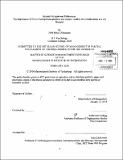Beyond occupational differences : the importance of cross-cutting demographics and dyadic toolkits for collaboration in a US hospital
Author(s)
DiBenigno, Julia Marie
DownloadFull printable version (5.215Mb)
Other Contributors
Sloan School of Management.
Advisor
Katherine Kellogg.
Terms of use
Metadata
Show full item recordAbstract
Scholars of work and occupations have long shown that asking members from different occupations to collaborate with one another is difficult because of differences in status, meanings, and expertise across occupational groups, but they have failed to consider how the demography of the setting affects cross-occupational collaboration. Our 12-month ethnographic study of two units in a US hospital demonstrates the importance of cross-cutting demographics and dyadic toolkits to cross-occupational collaboration. In this paper, we demonstrate that a social structure characterized by cross-cutting demographics between occupational groups (where occupational membership is uncorrelated with demographic group membership) can loosen the occupational identity and status order, thereby creating space for members of cross-occupational dyads (e.g., nurses and patient-care technicians) to draw on other shared social identities (e.g., shared race, age, immigration-status) in their interactions with one another. Drawing on a shared social identity at the dyad level provides members with alternative (nonoccupational) expertise, meanings, status rules, and emotional scripts that facilitate collaboration across occupational differences. These findings about cross-cutting demographics and dyadic toolkits have implications for research on cross-occupational collaboration and demography and intergroup relations.
Description
Thesis: S.M. in Management Research, Massachusetts Institute of Technology, Sloan School of Management, 2014. Cataloged from PDF version of thesis. Includes bibliographical references (pages 58-65).
Date issued
2014Department
Sloan School of ManagementPublisher
Massachusetts Institute of Technology
Keywords
Sloan School of Management.